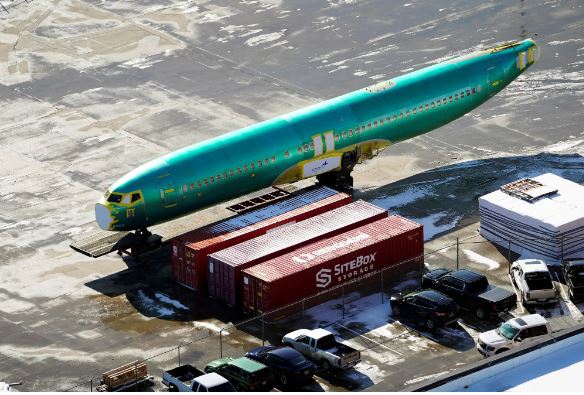Boeing announced on Monday that it has agreed to purchase Spirit AeroSystems, a major supplier, in a $4.7 billion stock deal, which includes assuming Spirit’s $8.3 billion debt. This acquisition marks the end of Boeing’s nearly two-decade-long strategy of outsourcing the production of key components for its commercial planes, including the body of the 737 Max and parts of the 767, 777, and 787.
The move comes as Boeing seeks to address persistent quality issues that have plagued Spirit in recent years. Although Boeing already has considerable influence over Spirit, owning the supplier outright will allow Boeing to better monitor and control production practices. This decision follows an alarming incident in January when a panel blew out of a Boeing plane mid-flight, prompting the company to take significant steps to improve quality.
Dave Calhoun, Boeing’s chief executive, stated that by reintegrating Spirit, Boeing could fully align its production and safety systems with its workforce. This acquisition, anticipated to close by mid-next year, must first receive regulatory and shareholder approval. As part of the transaction, Boeing will also spin off certain portions of Spirit to Airbus, its European competitor.
Boeing’s reliance on independent suppliers began in the 2000s to reduce costs and increase profits. Spirit AeroSystems was created during this outsourcing push in 2005 when Boeing sold a division in Wichita, Kansas, and operations in Oklahoma. Despite Spirit’s work for other aerospace companies like Airbus, Bombardier, Lockheed Martin, Northrop Grumman, and Rolls-Royce, Boeing remains its primary customer, accounting for 64% of Spirit’s net revenue last year. Airbus accounted for 19%.
Boeing’s offer to purchase Spirit at $37.25 per share represents a 30% premium over Spirit’s stock price at the end of February, before the companies announced they were in talks. Spirit’s quality issues led to a leadership change last fall when Patrick Shanahan, a former Boeing executive and senior Defense Department official, became CEO. Shanahan, known for his ability to turn around troubled programs, is now a leading candidate to replace Calhoun, who plans to step down by the end of the year.
Boeing has faced its own quality challenges. The company has been under intense scrutiny since the January 5 incident when a panel blew out on a 737 Max 9 during an Alaska Airlines flight. The panel, a door plug covering an unneeded emergency exit, appeared to have left a Boeing factory without the necessary bolts. Boeing has been unable to find documentation of the work, and the National Transportation Safety Board (NTSB) reported that the panel had been removed for repairs by Spirit.
In response, Boeing has implemented several changes to improve quality. The company has expanded training, simplified plans and processes, and increased inspections at its 737 factory in Renton, Washington, and at Spirit. Since March, Boeing has stopped accepting 737 fuselages from Spirit that do not meet its standards, previously tolerating flaws that could be fixed later to keep production moving.
Elizabeth Lund, a top Boeing quality executive, noted significant improvements from these changes, including fewer major defects and faster assembly of the Max once fuselages arrive in Renton. Boeing also aims to reduce “traveled work,” manufacturing tasks performed out of sequence, which can disrupt the complex process of making airplanes and contribute to defects and poor workmanship.
In a recent briefing, Lund explained how the January incident occurred, revealing that a crew, responsible for readying the plane to be moved outside, put the door plug back in place without its bolts. This disclosure, along with other comments, drew a sharp rebuke from the NTSB for violating rules about discussing an ongoing investigation.
Boeing has since apologized to the NTSB, acknowledging that it overstepped the board’s role as the source of investigative information. The company’s acquisition of Spirit represents a strategic reversal aimed at regaining control over its production process and ensuring the quality and safety of its aircraft.

